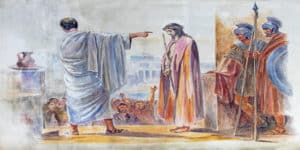Introduction: The age of the earth, or more specifically how the findings of modern science relate to Genesis 1, remains a heated topic. Sadly, many believers who together affirm the…
We said in a separate article that God revealed His name to Moses as YHWH. Now, please understand that I am not a Greek or Hebrew scholar, and I certainly don’t have a seminary education, so I asked Jeff Pallansch, one of my coworkers, to read and comment on this article and help me navigate these rather turbulent waters.
Some have wondered if it is possible for later books to be added to the Bible. Several “lost books” of the Bible have been suggested over the years. Yet the Bible and history reveal important reasons this should not and cannot take place.
In Exodus 3:13-15 God identified Himself to Moses as YHWH (pronounced Yahweh), and identified that as His “memorial name to all generations.” The root of this name is the Hebrew verb hayah, “to be”. This is the God who is—who He is now, who He has always been, and who He will always be.
I recently heard a minister say that if God doesn’t feel close to us, it’s our fault. Is this true? Not according to Job.
How many times have you heard a Christian in the United States say they are being persecuted? …
“Then God said, ‘Let us make man in our image, according to our likeness.’…
We read in Acts 11:26, “And the disciples were called Christians first in Antioch.”
Many believe Biblical prophecy suggests the idea of future events that have little application for today. However, Scripture notes four reasons Biblical prophecy matters in our lives right now.
“Let us mark what kind of Being the Redeemer of mankind must needs be, in order to provide eternal redemption for sinners. If no one less than the Eternal God, the Creator and Preserver of all things, could take away the sin of the world, sin must be a far more abominable thing in the sight of God than most men suppose.”[1]













